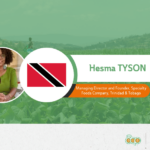News from African countries
- 03/04/2020
- Posted by: Gaetan Dermien
- Category: Uncategorized
As the country most affected in Africa by Covid-19, an unprecedented three-week containment was decreed. The government has banned the sale of alcohol and cigarettes and all travel. The authorities have planned an aid plan to make it easier for banks to borrow and lend.
Containment officially began on March 30, 2020. It is not a general confinement, only twelve cities in the south of the country, including Cotonou, Ouidah, Allada and Porto-Novo, the capital, are concerned. A cordon sanitaire has been set up around this area. The police are organising the controls: no exits and no entries into this area, except with a derogation from the prefects.
On 31 March 2020, a transport strike notice was filed in response to the more restrictive anti-coronavirus measures taken against the transport sector: disinfection of compulsory transport vehicles and the presence of hydro-alcoholic products at bord ; prohibition of surcharges ; taxis are limited to 4 passengers on board and buses to 50 passengers in intercity transport buses.
Containment became official on 31 March 2020 for a period of 30 days with a night curfew from 8pm to 5am. A “state of public health emergency” has been declared in view of the risk of spreading the coronavirus. Containment concerns the entire population except for people working for organisations providing essential goods and services.
Two regions are affected by the containment decision which started on 30 March 2020. Traffic is restricted for two weeks for two days in the Greater Accra Metropolitan Area and the Greater Kumasi Metropolitan Area. Only exits for essential purchases are allowed.
The state of health emergency obliges taxis to take only three passengers (previously six) and minibuses to take seven (previously 10). This limitation caused a transport strike in Conakry.
Curfews have been imposed at night and Kenyans are moving away from major cities by public transport. Kenya has seen a severe decline in its exports of fresh fruit and vegetables to the EU. Complete or partial blockades by European countries have forced some importers in Europe to cancel or reduce their orders.
The inhabitants of the capital Antananarivo have been going to the countryside for several days. Checkpoints have been set up on National Road 7 to monitor the temperature of people travelling to the other provinces.
Producers are suffering because the pineapples are ripe and ready to be harvested. But there are no buyers. The growers are allowed to go alone to the fields, respecting the usual precautions to avoid the spread of the corona virus.
Since 29 March 2020, it has been decided to prohibit the movement between the regions of the country, except for medical teams, heavy goods vehicles and special teams responsible for water, electricity and telecommunications services. A decision was taken to close schools, universities, land and sea borders and airspace to commercial flights.
Containment began this Monday evening, March 30, in Nigeria in the cities of Lagos, Abuja and Ogun State. Financial activities that do not require the public to enter are being maintained. In Lagos, schools, public places and non-food shops are closed. Trains and airports are at a standstill.
The decisions to close borders will have an impact on Togo’s agricultural export products (cotton, coffee, cocoa), creating significant losses of income. The country’s domestic markets will no longer be able to be supplied, and food security is likely to be seriously affected. Solutions are already being proposed for the long term by promoting the local production of rice substitutes such as cassava and yams, developing local fish farming, developing a local fertilizer industry, implementing a product storage strategy (6 months) to maintain acceptable prices.
SMEs are concerned about the long-term consequences for their activities and are calling for measures to cushion their impact (reduced taxation, lower social security charges, lower fuel prices, suspension of bank loans).
Crop production is likely to be delayed due to the delay in fertilizer imports.
Already some companies have ceased their activities while others have put their staff out of work. On 1 April, the President of the Republic announced the setting up of a Recovery and Solidarity Fund of 400 billion CFA francs to be financed by the State, international donors and the national and international private sector. (Sources : Agridigitale Info)
On 30/03/2020, the government decreed a total confinement of the population for 21 days. Only health and safety personnel will be allowed to go to their workplace. In Harare, all shops are closed except for supermarkets in the city centre. During the last weekend, many inhabitants of the capital went to the provinces. There is a risk that many people living on informal activities that do not have regular salaries will not be able to buy provisions for long periods of time. In addition, some areas of the capital are without electricity and running water, which makes it difficult to store goods. Zimbabwe allows the purchase of local products in foreign currency. The risk could be a weakening of the national currency exchange rate.



![EU and GB approval changes (August-November 2024) 9-FFM+-[ENG]](https://news.colead.link/wp-content/uploads/2024/06/9-FFM-ENG-150x150.jpg)
